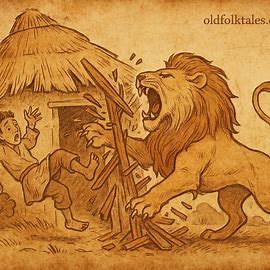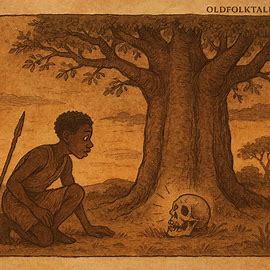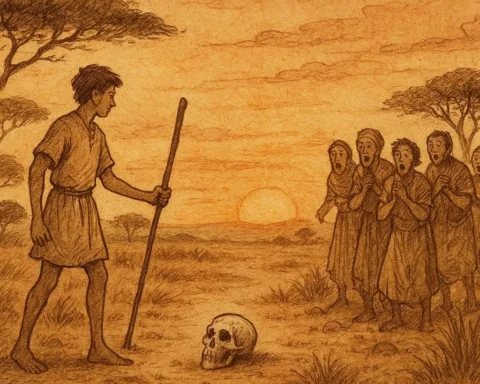In the dry season when grasses were thin and bartering kept the villages alive; Antelope went to Leopard with a simple request under the shade of a fever tree: may Leopard’s he-goat dwell in Antelope’s corral with his she-goat for the purpose of breeding? Their agreement was spoken plainly and with customary respect, after the she-goat had borne three times, Antelope would return to Leopard a young she-goat along with the he-goat; until that time Antelope would keep the animals, feed them, and tend them. Leopard agreed and entrusted his he-goat to Antelope’s care.
Seasons turned like the wheel of the sky. The she-goat bore three times; each birth attended with the neighbourhood’s quiet goodwill. Keeping his word, Antelope gathered a young nanny and the he-goat and made the slow walk to Leopard’s yard beneath the wide, patient sun. He presented the animals with a bowed greeting: “Here are thy he-goat and a young she-goat; take them and raise thy stock as is just.” Leopard, however, answered that his corral was not yet built and that the animals should remain in Antelope’s keeping a while longer. Antelope, who had been honest in his care, accepted the delay and returned home.
Under Antelope’s watchful hand the young nanny prospered. She fattened and bred and bred again, until Antelope’s patience and industry had multiplied the herd until it numbered forty. Word of Antelope’s flourishing fold spread as quietly as smoke; Leopard’s heart, who had begun the affair, was pricked by the sight of his neighbour’s abundance. He returned, insisting the goats now be divided. Antelope reminded him gently of the history, he had attempted to return the he-goat when first requested, and Leopard had declined because of the unfinished corral, but Leopard pressed his claim.
The matter escalated into a dispute that could not be smoothed at the kitchen hearth. So, the animals turned to Lord Elephant, elder and judge among them, asking him to set the law aright. Deer was sent with the summons to Antelope, bidding him come to Elephant’s court on the appointed morning and to bring the goats. Antelope waited that night under the stars, fret fluttering like a trapped bird; he paced his path and considered how to speak plain truth before so august a council. Philantomba passed by and learned the story; he spoke loudly that he could plead well for a fee, though Antelope turned from him in anger and uncertainty.
READ THIS: The Hare and the Leopard | An Angolan Folktale
On the appointed day Antelope led his goats into Lord Elephant’s great clearing. The court was a solemn array: Palanga, Buffalo, Sefu, Lion, Kisebele, Semvu, heavy and thoughtful beasts, and Leopard himself sat waiting in measured silence. Antelope made his respectful obeisance to Lord Elephant and took his place with the goats at his side, the animals shifting uneasily as neighbours took their seats.
Before the affair advanced, a commotion: Philantomba hurried by with his cap still upon his head and greeted from a distance without removing it. Lord Elephant noticed and asked who had passed so hastily without proper respect. Deer was ordered to seize Philantomba and bring him before the bench. Bound, Philantomba stood and explained in earnest voice that he had been hurrying because his mother had gone to war and his father, a curious event, was in labour. The court blinked and then returned to the business at hand.
The tale of the borrowed head and the promised return was recounted plainly: Antelope had honoured the agreement, had attempted to return Leopard’s he-goat and been refused, and in the meantime the entrusted nanny had multiplied under Antelope’s care. Lord Elephant listened with the weight of age, eyes like slow ovals, weighing custom and the rules of household exchange.
With measured voice Lord Elephant pronounced judgment: “Leopard, you shall receive your he-goat and two she-goats to make whole your stock. You shall not demand more. The law is this: a male does not carry offspring; where a female gives birth under another’s keeping, the fruits belong to that keeper beyond the simple loan of the male. Fairness requires measured return, not profit from delay.”
A murmur of agreement passed among the beasts. Leopard’s pride, having been judged, drew him to accept the award and withdraw. Antelope returned to his fold, which remained, though altered by time and births. The court dispersed; the trees took back their quiet. Life in the village resumed the old rhythms of grazing and barter.
Thus was the matter settled: the case of the goats closed before Lord Elephant, whose judgment upheld clarity, custom, and the rule that agreements kept plainly protect both owner and keeper when animals and obligations are entrusted. The memory of Lord Elephant’s measured words endured in gatherings and at firesides, teaching that fairness outlives anger and hastily taken pride.
Moral Lesson
Fair agreements and clear terms protect neighbours: when lending animals or goods, be explicit about duration and return, because delay can change outcomes. The judge’s ruling also reminds us of an ancient practical rule males do not bear young and that justice must consider both custom and circumstance to restore balance.
Knowledge Check
- Q: Who brought the case to the animal court in this Angolan folktale?
A: Antelope and Leopard brought the dispute over breeding and ownership to Lord Elephant’s court. - Q: What agreement began the conflict between Leopard and Antelope?
A: Leopard’s he-goat was loaned to Antelope to breed with Antelope’s she-goat, with a return of a young she-goat after three births. - Q: Which figure served as the judge and delivered the final ruling?
A: Lord Elephant acted as the elder judge and pronounced the decision. - Q: What was Lord Elephant’s primary legal principle in the judgment?
A: He ruled that a male does not bear young and that offspring raised by another keeper belong, within reason, to the keeper. - Q: How did the court resolve Leopard’s claim?
A: Lord Elephant ordered Leopard to receive his he-goat plus two she-goats, not to seize more than fairness allowed. - Q: What cultural lesson does this Angolan folktale emphasize?
A: The story emphasizes fair agreements, clear terms, and just remedies to prevent disputes between neighbours.
Source: Folktales of Angola, Smithsonian Institution Libraries







